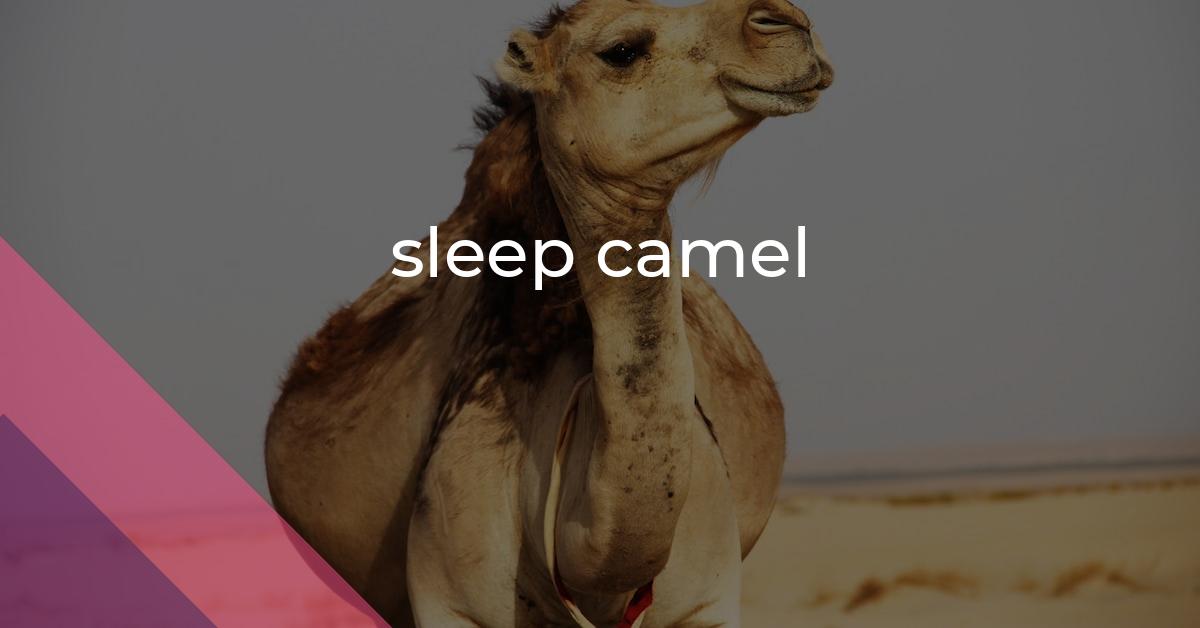sleep camel: Idiom Meaning and Origin
What does ‘sleep camel’ mean?
The idiom "sleep camel" refers to a situation where one person takes on the burden or responsibility of another person, typically out of kindness or obligation, allowing the other person to relax or avoid work. This idiom draws a parallel between the act of carrying heavy loads on a camel's back and someone taking on someone else's troubles or responsibilities.

Idiom Explorer
The idiom "the straw that broke the camel's back" means a small or seemingly insignificant event that causes a larger, already burdened situation to break or become too much to handle.
The idiom "take a load off" means to relax or relieve oneself of a burden or responsibility.
The idiom "slings and arrows" refers to the challenges and difficulties one faces in life. It implies enduring and overcoming obstacles with resilience and fortitude.
The idiom "sling one's hook" means to leave or go away, often used in a command or as a suggestion. It may have originated from the action of throwing a fishing hook to move away from a certain place.
The idiom "sleep with the fishes" means to be killed or murdered, often by being thrown into a body of water. It is a euphemism that originated from Mafia culture and is used to imply a violent and permanent end.
The idiom "sleep with" means to have sexual relations with someone. It is a euphemistic phrase used to describe intimacy or a romantic relationship in a figurative sense.
The idiom "sleep together" means to have sexual intercourse. It is a euphemistic expression that refers to the act of two people sharing a bed for sexual activity.
The idiom "sleep rough" means to sleep outside or in an uncomfortable place, typically due to a lack of housing or homelessness.
The idiom "sleeping policeman" refers to a bump or hump on the road intended to slow down vehicles. It is also known as a speed bump or a road hump.
FAIL
Sleep camel is an idiom that describes a person who can function on very little sleep or rest. This means that they are able to stay awake or work for long periods without needing much sleep. It's like comparing them to camels, who can survive in harsh desert environments without much sleep or rest.
The idiom "camel's nose" is related to sleep camel. "Camel's nose" is used to describe a situation where a small, seemingly harmless action or request is allowed, which then leads to much larger consequences or requests. It's like the camel's nose getting into the tent, and then eventually the whole camel ends up inside. Similarly, someone who is a sleep camel may start off working just a few extra hours, but then gradually end up working long hours consistently.
Another related idiom is "the straw that broke the camel's back." This idiom refers to the final, seemingly insignificant event that causes a person or system to collapse or break down. It's like adding one more straw to an already burdened camel, causing it to reach its breaking point. A sleep camel may be able to handle a lot of work and little sleep, but eventually, there may be a tipping point where they can no longer handle any more and experience burnout.
"take a load off" is another idiom related to sleep camel. It means to relax or take a break from work or responsibilities. For a sleep camel, taking a load off can be difficult because they are used to carrying a heavy workload and functioning on minimal rest. However, it's important for them to take breaks and rest their minds and bodies to avoid exhaustion and burnout.
"sleep in" is a related idiom that refers to staying in bed later than usual, usually in order to get more sleep or rest. For a sleep camel, sleeping in may not be a common occurrence because they are used to functioning on minimal sleep. However, it's important for them to prioritize sleep and make time for quality rest, even if it means sleeping in occasionally.
"sleep with" is the last related idiom that refers to sharing a bed or sleeping together with someone. In the context of sleep camel, this idiom doesn't directly relate to it. However, it's important to note that sleep and rest are essential for overall health and well-being, and having a comfortable sleeping environment and routine can contribute to better sleep quality.
Overall, the idiom sleep camel represents individuals who can function effectively with minimal sleep or rest. It draws upon the enduring qualities of camels in the wild and is often used to admire or recognize individuals with exceptional stamina and dedication. While it may not be commonly used in everyday conversation, the idiom sleep camel serves as a metaphorical representation of resilience, reliability, and endurance.
Example usage
He stayed up all night studying for the exam, but could not remember anything the next day. He definitely had a sleep camel.
After the long workweek, she decided to sleep in until noon on Saturday. She needed to recharge her batteries and get rid of her sleep camel.
The newborn baby woke up every two hours during the night to be fed. The exhausted parents had to take turns to get rid of their sleep camel.
More "Animal" idioms



